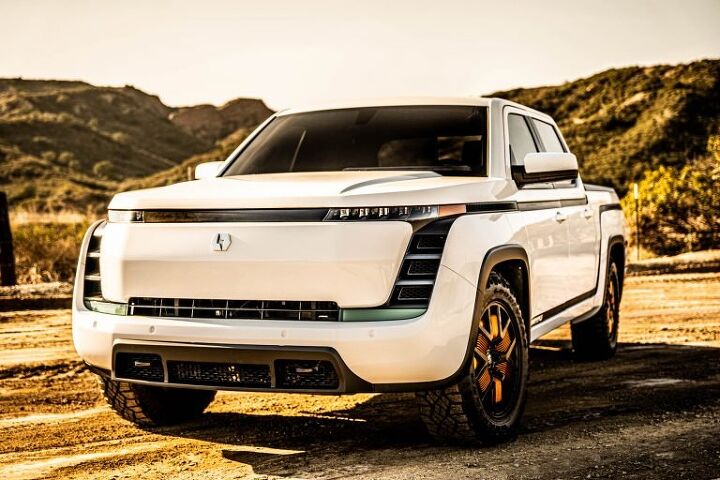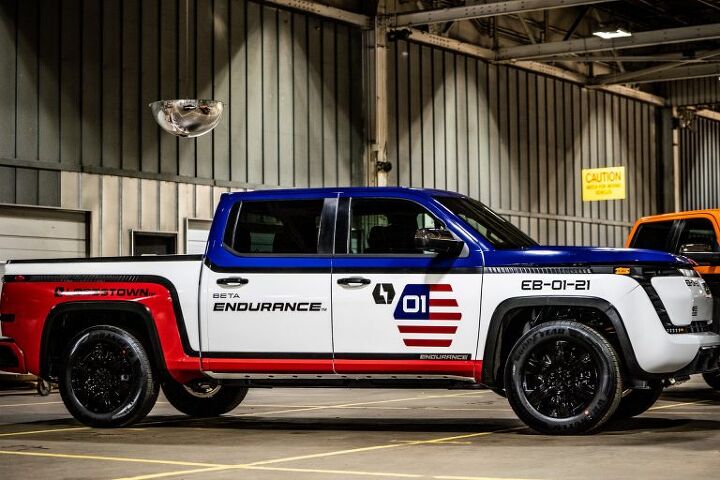Lordstown Deathwatch: Another Unflattering SEC Filing Emerges

We’ve got more bad news about Lordstown Motors. Following several volleys of bad mojo ending with the departure of its upper management, the EV startup has informed the Securities and Exchange Commission (SEC) on Thursday that it doesn’t have any binding purchase orders or commitments.
That’s not what the company was saying several months ago. Hell, that wasn’t even what it said earlier this week when President Rich Schmidt told the Automotive Press Association the company had enough orders to support two years of production. Since the ability to sell automobiles is a somewhat relevant factor in an automaker’s long-term success, we’re getting concerned that Lordstown isn’t long for this world.
While we cannot say if the company will break its promise of delivering its all-electric Endurance pickup by September, automakers (including the well-established ones) have a habit of delaying debuts. This is especially true of EV startups and basically unavoidable among those that are never going to get off the ground — which seems to be the direction Lordstown is heading.
Despite Schmidt trying to smooth things over with investors, these SEC filings have been incredibly damning. Last week, a filing revealed that the aspiring automaker probably didn’t have sufficient capital to commence production as planned. There were even claims it might not have enough dough to remain operational. But the company specifically merged with DiamondPeak Holdings (a special purpose acquisition company) to get on NASDAQ and goose its IPO.
Thursday’s SEC documents offered more unsettling information. After explaining the importance of marketing strategy in regard to fleet management companies, it noted that it had entered into purchasing agreements that would “establish the terms and conditions of potential future purchases and other cooperation.”
It then explained the general rules they were operating under:
·Term of 3 to 5 years;
·Designation of Lordstown Motors as a preferred supplier;
·Order procedures, including forecasting, confirmation, statusing, and cancellation procedures;
·Down payment terms, which are generally 5 [percent] down 90 days prior to the requested delivery date;
·Invoicing, delivery and payment terms; and
·Other customary terms, including warranties, indemnification, intellectual property use, insurance and confidentiality terms.
These vehicle purchase agreements generally include a projected buyer order schedule over the 3 to 5 year life of the agreement, and may be terminated by either party at will on 30 days’ notice. They do not commit the counterparties to purchase vehicles, but we believe that they provide us with a significant indicator of demand for the Endurance.
To clarify recent remarks by company executives at the Automotive Press Association online media event on June 15, although these vehicle purchase agreements provide us with a significant indicator of demand for the Endurance, these agreements do not represent binding purchase orders or other firm purchase commitments.
That last paragraph is the most important because it’s the one where the company effectively admits to lying. Though I suppose the term “binding” could be used as a semantic defense. But this remains a bad situation since the automaker really doesn’t have anything to show for itself. There apparently aren’t any binding orders, it’s leasing the intellectual property required for the pickup from Workhorse, one of its prototypes recently burned down, and GM has an option to repurchase the facility and all transferred assets of the factory if the company cannot repay the $40 million loan and has to abandon ship.
Meanwhile, Lordstown has invited investors, analysts, and journalists to its factory next week (which had a massive solar array installed outside this year) to tour the grounds and talk about the truck. But the SEC filing stated that the company would be postponing its annual shareholder’s meeting until August 19th — which is a full month behind schedule and likely a bad omen.
[Images: Lordstown Motors]

A staunch consumer advocate tracking industry trends and regulation. Before joining TTAC, Matt spent a decade working for marketing and research firms based in NYC. Clients included several of the world’s largest automakers, global tire brands, and aftermarket part suppliers. Dissatisfied with the corporate world and resentful of having to wear suits everyday, he pivoted to writing about cars. Since then, that man has become an ardent supporter of the right-to-repair movement, been interviewed on the auto industry by national radio broadcasts, driven more rental cars than anyone ever should, participated in amateur rallying events, and received the requisite minimum training as sanctioned by the SCCA. Handy with a wrench, Matt grew up surrounded by Detroit auto workers and managed to get a pizza delivery job before he was legally eligible. He later found himself driving box trucks through Manhattan, guaranteeing future sympathy for actual truckers. He continues to conduct research pertaining to the automotive sector as an independent contractor and has since moved back to his native Michigan, closer to where the cars are born. A contrarian, Matt claims to prefer understeer — stating that front and all-wheel drive vehicles cater best to his driving style.
More by Matt Posky
Latest Car Reviews
Read moreLatest Product Reviews
Read moreRecent Comments
- Joe65688619 Under Ghosn they went through the same short-term bottom-line thinking that GM did in the 80s/90s, and they have not recovered say, to their heyday in the 50s and 60s in terms of market share and innovation. Poor design decisions (a CVT in their front-wheel drive "4-Door Sports Car", model overlap in a poorly performing segment (they never needed the Altima AND the Maxima...what they needed was one vehicle with different drivetrain, including hybrid, to compete with the Accord/Camry, and decontenting their vehicles: My 2012 QX56 (I know, not a Nissan, but the same holds for the Armada) had power rear windows in the cargo area that could vent, a glass hatch on the back door that could be opened separate from the whole liftgate (in such a tall vehicle, kinda essential if you have it in a garage and want to load the trunk without having to open the garage door to make room for the lift gate), a nice driver's side folding armrest, and a few other quality-of-life details absent from my 2018 QX80. In a competitive market this attention to detai is can be the differentiator that sell cars. Now they are caught in the middle of the market, competing more with Hyundai and Kia and selling discounted vehicles near the same price points, but losing money on them. They invested also invested a lot in niche platforms. The Leaf was one of the first full EVs, but never really evolved. They misjudged the market - luxury EVs are selling, small budget models not so much. Variable compression engines offering little in terms of real-world power or tech, let a lot of complexity that is leading to higher failure rates. Aside from the Z and GT-R (low volume models), not much forced induction (whether your a fan or not, look at what Honda did with the CR-V and Acura RDX - same chassis, slap a turbo on it, make it nicer inside, and now you can sell it as a semi-premium brand with higher markup). That said, I do believe they retain the technical and engineering capability to do far better. About time management realized they need to make smarter investments and understand their markets better.
- Kwik_Shift_Pro4X Off-road fluff on vehicles that should not be off road needs to die.
- Kwik_Shift_Pro4X Saw this posted on social media; “Just bought a 2023 Tundra with the 14" screen. Let my son borrow it for the afternoon, he connected his phone to listen to his iTunes.The next day my insurance company raised my rates and added my son to my policy. The email said that a private company showed that my son drove the vehicle. He already had his own vehicle that he was insuring.My insurance company demanded he give all his insurance info and some private info for proof. He declined for privacy reasons and my insurance cancelled my policy.These new vehicles with their tech are on condition that we give up our privacy to enter their world. It's not worth it people.”
- TheEndlessEnigma Poor planning here, dropping a Vinfast dealer in Pensacola FL is just not going to work. I love Pensacola and that part of the Gulf Coast, but that area is by no means an EV adoption demographic.
- Keith Most of the stanced VAGS with roof racks are nuisance drivers in my area. Very likely this one's been driven hard. And that silly roof rack is extra $'s, likely at full retail lol. Reminds me of the guys back in the late 20th century would put in their ads that the installed aftermarket stereo would be a negotiated extra. Were they going to go find and reinstall that old Delco if you didn't want the Kraco/Jenson set up they hacked in?




































Comments
Join the conversation
Latest news: Executives sold millions of dollars worth of stock in February before Lordstown earning report. Fecal matter meet air moving device Stick a fork in Lordstown, they are finished (the company and the area)
I don’t think much could be less flattering than that grill…also for solar panels, they are typically leased and offset electricity costs, so probably wasn’t a capital expense no matter who installed them